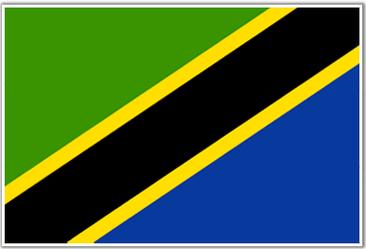
Church Grand Opening in Tanzania Results in Tragedy
William Stark, Regional Manager for Africa
5/16/2013
Washington, D.C.
International Christian Concern
The opening of St. Joseph's Roman Catholic Church in Arusha, Tanzania was supposed to be a joyful occasion. Instead, it became a scene of terror and death when a bomb exploded only minutes into the inaugural Mass service. As only the most recent act of violence in a series of attacks on Christians in Tanzania since the fall of 2012, it seems the country's reputation as a country "free of religious violence" is in jeopardy.
Three Killed in Church Bombing
On Sunday, May 5, St. Joseph's Roman Catholic Church was scheduled to conduct its grand opening. People from all over Tanzania's northern city of Arusha gathered at the church to participate in the festivities. "There were so many people, the church was full, and the faithful were sitting on benches outside - it was a great day of celebration," a motorcycle taxi driver parked outside the church told Al Jazeera.
The inauguration was led by the Vatican's Ambassador to Tanzania, Archbishop Francisco Montecillo Padilla, and accompanied by Arusha's Archbishop, Josaphat Louis Lebulu. Shortly after 11 am, minutes into the service, a bomb was thrown into the church setting off a deadly explosion. According to witness reports, the bomb was tossed into the church from a motorcycle outside.
After the explosion, congregants fled the scene, panicked and disoriented by the blast. "When it exploded there was a stampede, people running in all directions, walking over each other, children were screaming and women crying," a witness told Al Jazeera. "I saw a dead woman trampled, I think even her two children were killed in the same way," another witness added.
When the dust settled, three Christians were killed and over 50 were wounded. Regina Luning'o Kuresoi, age 45, James Gabriel, age 16, and Patricia Joackim, age 9, died in the bombing and were laid to rest on the church premises on Friday, May 10th.
Perpetrators Arrested and Charged
The regional police commissioner of Arusha, Magesa Mulongo, told the press that arrests had been made in connection with the bombing. Mulongo went further to say that police wouldn't stop their investigation until all the perpetrators are brought to justice. "Investigations are ongoing," Mulongo told French news agency AFP after confirming arrests had been made.
Speaking to the press, Home Affairs Minister, Dr. Emmanuel Nchimbi, said police had arrested two Tanzanians and four foreigners, including three from the United Arab Emirates and one from Saudi Arabia. Dr. Nchimbi named Victor Ambrose Calist as one of the six being held in connection with the bombing.
A week later, Calist, a 20-year-old motorcyclist, was charged for throwing the bomb into the crowded church. The four United Arab Emirates and Saudi nationals were released after further investigations proved their innocence. "The government has formed [a] taskforce to investigate the matter and I am confident that those who are behind this incident will be arrested and taken to court," Dr. Nchimbi told the press. "We are doing everything in our capacity to address the situation."
Both secular and religious groups across Tanzania released statements condemning the attack, including Tanzania's president, President Jakaya Kikwete, who called the bombing an "act of terrorism." The president went on to encourage Christians to continue attending church on Sundays. "If we don't do so, we will have given victory to those who carried out the attack," he told the press.
Sheikh Issa Bin Shaaban Simba, head of the Tanzania Muslim Council, said: "We condemn the attack and we urge security [organizations] to work hard to find the culprits. This is a sad situation for all Tanzanians."
A Symptom of a Larger Problem?
The bombing of St. Joseph's is only the most recent act of violence perpetrated against Christians in Tanzania. Since October 2012, anti-Christian violence seems to be escalating in the once religiously tolerant nation. In October, mobs of enraged Muslims burned down three churches and destroyed other Christian properties in Tanzania's capital of Dar es Salaam when a Christian boy was rumored to have urinated on a Quran.
Then in February, two Christian pastors were murdered. On February 11, Pastor Mathayo Kachili of the Tanzania Assemblies of God Church (TAG) was killed while trying to intervene in an attack by Muslim youths on Christian butchers. Six days later, Father Evarist Mushi, a Catholic priest, was murdered on the island of Zanzibar off Tanzania's east coast when two men, presumed to be Muslim extremists, confronted him at the entrance of his church and shot him in the head.
After news of Mushi's murder spread, a threatening text message was received by local bishops and priests. The text read, "We thank our young men, trained in Somalia, for killing an infidel. Many more will die. We will burn homes and churches. We have not finished: at Easter, be prepared for disaster." The text message was signed by an extremist group naming itself the 'Muslim Renewal.'
Although no anti-Christian violence was perpetrated during the Easter holiday, this trend of escalation can easily be established. From statements made by the Tanzanian government in regards to the St. Joseph's bombing, it seems the government is willing to start protecting Christians from further attacks."[The government] will provide security around all places of worship," President Kikwete said to Christian mourners. Whether or not this extra security will protect Christians from future attacks like the bombing at St. Joseph's remains to be seen.
For interviews, contact William Stark, Regional Manager for Africa: [email protected]
# # #
You are free to disseminate this news story. We request that you reference ICC (International Christian Concern) and include our web address, www.persecution.org. ICC is a Washington, D.C.-based human rights organization that exists to help persecuted Christians worldwide. ICC provides Awareness, Advocacy, and Assistance to the worldwide persecuted Church. For additional information or for an interview, contact ICC at 800-422-5441.
International Christian Concern
2020 Pennsylvania Ave. NW #241
Washington, D.C. 20006
www.persecution.org | E-mail: [email protected]


 RSS Feed
RSS Feed